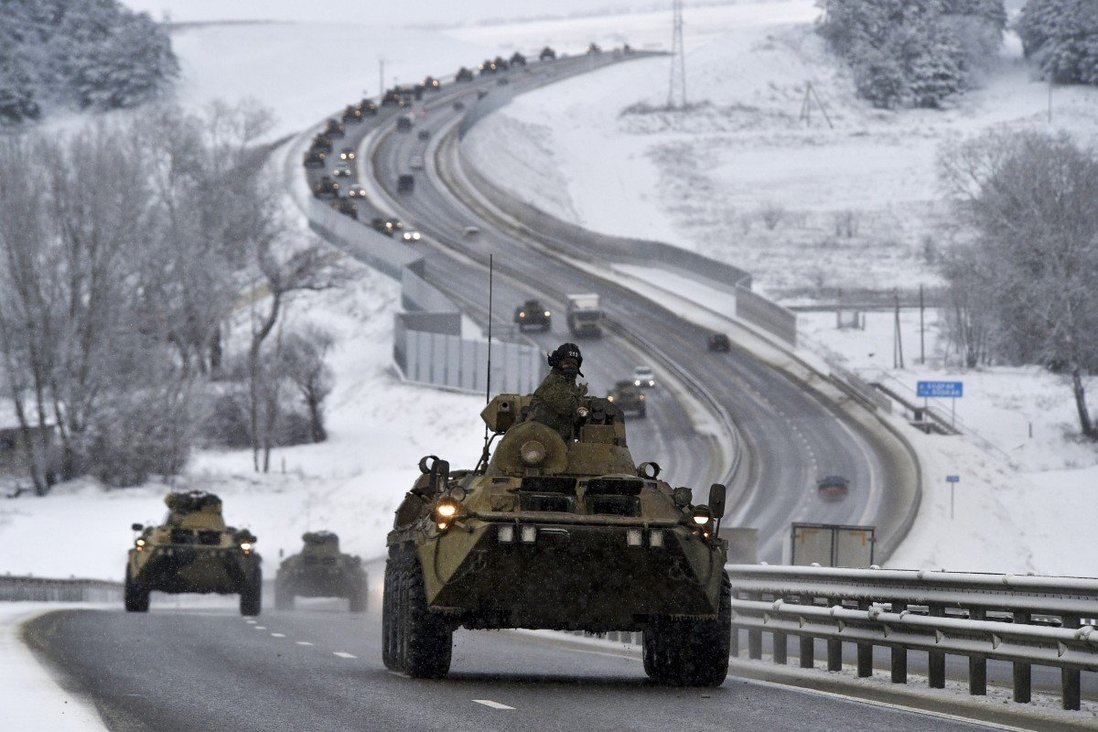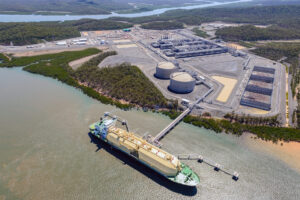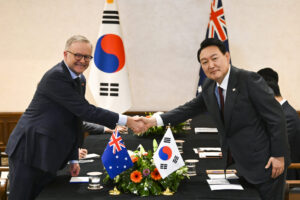
Make no mistake: the heightened risk of armed conflict between Russia and Ukraine has serious implications for Europe, especially the Nato members, as it does for the rest of the world. But most importantly, it has massive strategic consequences for the US. And that’s where it matters for Australia.
To judge from much western media reporting, to this point European and other governments have responded to President Putin’s pressure on Ukraine with more hype than substance, affording the Russian Foreign Minister and his diplomats a few easy free kicks.
In response to comments by Australia’s Defence Minister, for instance, Russia’s ambassador to Australia described the comments as “comic book style propaganda like Batman versus Joker”. A cheap shot, perhaps, but effective.
A Russian invasion of Ukraine is moot. The opportunity is certainly there for Russia to offer even more support to the separatist forces in the Donbas (the old Russian-speaking, coal-mining region of Ukraine) and stage the kind of takeover that was so successful in the Crimea in 2014. Ukraine and the rest of the world shouted its disapproval and did nothing. Russia is still there, its position consolidated. Putin could try the same thing again, with impunity. And it would help meet his short-term aim of protecting Russia’s western flank. No one should bet against that possibility.
Make no mistake: the heightened risk of armed conflict between Russia and Ukraine has serious implications for Europe, especially the Nato members, as it does for the rest of the world. But most importantly, it has massive strategic consequences for the US. And that’s where it matters for Australia.
To judge from much western media reporting, to this point European and other governments have responded to President Putin’s pressure on Ukraine with more hype than substance, affording the Russian Foreign Minister and his diplomats a few easy free kicks.
In response to comments by Australia’s Defence Minister, for instance, Russia’s ambassador to Australia described the comments as “comic book style propaganda like Batman versus Joker”. A cheap shot, perhaps, but effective.
A Russian invasion of Ukraine is moot. The opportunity is certainly there for Russia to offer even more support to the separatist forces in the Donbas (the old Russian-speaking, coal-mining region of Ukraine) and stage the kind of takeover that was so successful in the Crimea in 2014. Ukraine and the rest of the world shouted its disapproval and did nothing. Russia is still there, its position consolidated. Putin could try the same thing again, with impunity. And it would help meet his short-term aim of protecting Russia’s western flank. No one should bet against that possibility.
But an invasion of Ukraine is an altogether bigger and riskier matter when the main game is a head-to-head old-fashioned game of strategic realpolitik with the US. After decades of domestic political and social division and pointless, costly wars internationally, US power is eroding, its self-confidence is diminished and its global authority deeply tarnished.
The President is given to ‘misspeaks’ and missteps, with his negotiating team in Geneva unable to make progress. The effective replacement of the Deputy US Secretary of State Wendy Sherman by Secretary of State Anthony Blinken in the Geneva talks with Russia’s Foreign Minister Lavrov demonstrates uncertainty on the part of the US in dealing with Putin. But while the US is evidently unable to extract concessions from Russia, it at least continues to pursue diplomacy and negotiation. Long may that last.
The Geneva talks highlight the fact that central to this crisis in eastern Ukraine is the strategic relationship between Russia and the US, with Russia seeking – successfully it would seem – to keep the US off balance and the US seeking – less successfully it would seem – to retain its strategic pre-eminence in Europe.
At this point, Putin holds the whip hand.
China is not a wild card in this. Apart from a couple of calls for restraint and negotiation leading to peaceful settlement, China has remained disengaged. Of course, President Xi doesn’t want Putin to mess up his Winter Olympics, and China sees no need to add fuel to Russia’s efforts to keep the US off balance when it is fully engaged in keeping the US off balance over Taiwan – with the US happy to reciprocate.
For the US, the question is not whether the stakes are presently higher in eastern Europe than they are in the western Pacific. The question is whether the US is able to realise its aim to preserve its global strategic pre-eminence, or whether it is on a pathway to ‘shared pre-eminence’ in regions where its competitors pursue their own versions of the Monroe doctrine.
And that’s what matters to Australia, given its long investment in US global superiority and its full-throated support for US policies wherever they in play – the Middle East, North Asia or even Europe. What is Aukus all about if it does not contemplate Britain’s enduring role in Europe as the platform on which it bases its global role?
Yet the maintenance of global pre-eminence by the US is not a foregone conclusion. Decades of armed conflict have hollowed out Its military forces, the logistic systems needed to fight even a small war are in disrepair, and there is little indication that US voters want their children deployed to yet another distant war.
So, at this point, Australia’s best option is to watch the situation in eastern Europe as it unfolds, calling, as it should, for diplomacy and negotiation, and to observe how the major Nato partners manoeuvre in circumstances not of their choosing.
Just as Australia often portrays itself as caught on the horns of an existential dilemma – economic security with China and strategic security with the US – so too the Europeans depend on Russia for much of their energy needs and for the economic benefits that trade with Russia brings while continuing to depend on the US for their strategic security. But just how this works itself out over the next decade or so has many implications for Australia.
Australia needs to resist its usual inclination to boisterous barracking. The threat to invoke Magnitsky-type legislation, not yet on the statute books, by the way, is more a sign of impotence than of statecraft.
This is a time to practise what the Southeast Asian governments do: watch carefully, keep quiet and stay out of harm’s way. Singapore’s Prime Minister, for instance, has repeatedly coached Australia’s Prime Ministers in measured and temperate diplomacy to temper their approaches to changing strategic conditions in Asia. More coaching is needed, evidently.
There’s much at stake here, and the Australian government would do well to exercise caution, deliberation and prudence.
Between the Lines Newsletter
The biggest stories and the best analysis from the team at the Australia Institute, delivered to your inbox every fortnight.
You might also like
McCarthy’s fall and the far-right influence on American foreign policy
Critical support for Ukraine’s war effort could be torpedoed by a small minority of US congressional extremists.
Who cares about national security?
In parliament last week, responding to the temporary blocking of a legislative favour to Santos, Foreign Minister Penny Wong berated the opposition. The bill – which did eventually pass – is designed to facilitate massive expansion of the gas industry.
Promoting a Free and Peaceful Indo-Pacific
Allan Behm’s address to the Australian Institute of International Affairs Korea Forum, Sydney on 15 April 2024.

